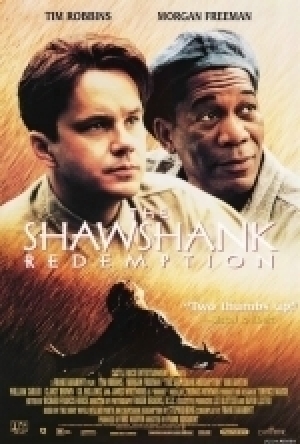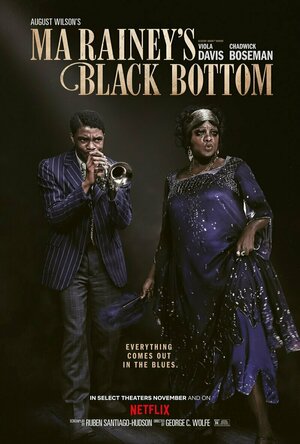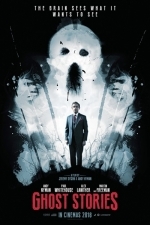Search
Search results
Omari Hardwick recommended The Shawshank Redemption (1994) in Movies (curated)
Sarah (7798 KP) rated Ma Rainey's Black Bottom (2020) in Movies
Jan 30, 2021
Boseman is amazing
Ma Rainey’s Black Bottom is the latest adaptation of the works of August Wilson brought to us by producer Denzel Washington, following on from the 2016 adaptation of Fences that earned Viola Davis a Best Supporting Actress Oscar. Here Washington hands over the directing reins to Tony award winner George C. Wolfe, while Viola Davis returns as the titular Ma Rainey.
Set in 1920s Chicago, the film follows a tense and fractious recording session with Ma Rainey and her backing band, old hands Toledo (Glynn Turman), Cutler (Colman Domingo) and Slow Drag (Michael Potts) alongside ambitious young horn player Levee (Chadwick Boseman). Tensions rise between Ma, Levee and the recording studio management (Jeremy Shamos as Irvin and Jonny Coyne as Sturdyvant) as each attempts to control the recording session and play songs that fit best with their own motives. Contributing to the frictions are Levee’s flirtation with Ma’s girlfriend Dussie Mae (Taylour Paige) and her Ma’s stuttering nephew Sylvester (Dusan Brown) as he attempts to introduce Ma’s signature song, Black Bottom.
Ma Rainey’s Black Bottom undoubtedly looks and sounds good. The cinematography and costumes are perfect and entirely in keeping with the 20s Chicago setting. And the blues music is captivating and beautifully made. To be quite honest I would’ve been quite happy to watch and listen to an entire film solely following the band and their music. However whilst it does look and sound good, it is so obviously a film adapted from a stage play and I’m afraid this isn’t a good thing. There’s a limited number of sets and virtually the entirety of the 90 minute run time is set within two rooms in the recording studio, which makes such a short film feel ridiculously drawn out. This isn’t helped by the huge reliance on very long scripted dialogue and conversational scenes. I can’t deny that the writing is good and is helped by strong performances from everyone involved, but there’s just too much dialogue. This might work on the stage, but on screen it doesn’t quite translate. There’s that much dialogue that the majority of scenes become too heavy and bogged down and sadly almost entirely forgettable. For me a film needs to balance dialogue with actual events and actions, and I’m afraid aside from the final act, nothing much happens here.
Fortunately this is at least boosted by some stellar performances. Viola Davis is brilliant as the spirited Ma Rainey, even if Ma herself as a character is rather unlikeable with some questionable motives for her actions and manners. The star however is the late Chadwick Boseman. While it’s very off putting to see how obviously thin and ill he was filming this, his performance is outstanding. He brings life and fun and heart to every scene he’s in and gives this film a massive boost. Even the drawn out dialogue heavy scenes become enthralling when he’s talking and the emotions on show are spectacular. Despite Viola Davis being the star as Ma, it’s Boseman that carried this film entirely on his shoulders. If he doesn’t win a posthumous Oscar for this, it’d be criminal.
Ma Rainey’s Black Bottom is a shining example of stellar performances, most notably Chadwick Boseman. It’s just a shame that the rest of the film doesn’t quite meet the high standards set by its stars.
Set in 1920s Chicago, the film follows a tense and fractious recording session with Ma Rainey and her backing band, old hands Toledo (Glynn Turman), Cutler (Colman Domingo) and Slow Drag (Michael Potts) alongside ambitious young horn player Levee (Chadwick Boseman). Tensions rise between Ma, Levee and the recording studio management (Jeremy Shamos as Irvin and Jonny Coyne as Sturdyvant) as each attempts to control the recording session and play songs that fit best with their own motives. Contributing to the frictions are Levee’s flirtation with Ma’s girlfriend Dussie Mae (Taylour Paige) and her Ma’s stuttering nephew Sylvester (Dusan Brown) as he attempts to introduce Ma’s signature song, Black Bottom.
Ma Rainey’s Black Bottom undoubtedly looks and sounds good. The cinematography and costumes are perfect and entirely in keeping with the 20s Chicago setting. And the blues music is captivating and beautifully made. To be quite honest I would’ve been quite happy to watch and listen to an entire film solely following the band and their music. However whilst it does look and sound good, it is so obviously a film adapted from a stage play and I’m afraid this isn’t a good thing. There’s a limited number of sets and virtually the entirety of the 90 minute run time is set within two rooms in the recording studio, which makes such a short film feel ridiculously drawn out. This isn’t helped by the huge reliance on very long scripted dialogue and conversational scenes. I can’t deny that the writing is good and is helped by strong performances from everyone involved, but there’s just too much dialogue. This might work on the stage, but on screen it doesn’t quite translate. There’s that much dialogue that the majority of scenes become too heavy and bogged down and sadly almost entirely forgettable. For me a film needs to balance dialogue with actual events and actions, and I’m afraid aside from the final act, nothing much happens here.
Fortunately this is at least boosted by some stellar performances. Viola Davis is brilliant as the spirited Ma Rainey, even if Ma herself as a character is rather unlikeable with some questionable motives for her actions and manners. The star however is the late Chadwick Boseman. While it’s very off putting to see how obviously thin and ill he was filming this, his performance is outstanding. He brings life and fun and heart to every scene he’s in and gives this film a massive boost. Even the drawn out dialogue heavy scenes become enthralling when he’s talking and the emotions on show are spectacular. Despite Viola Davis being the star as Ma, it’s Boseman that carried this film entirely on his shoulders. If he doesn’t win a posthumous Oscar for this, it’d be criminal.
Ma Rainey’s Black Bottom is a shining example of stellar performances, most notably Chadwick Boseman. It’s just a shame that the rest of the film doesn’t quite meet the high standards set by its stars.
Bob Mann (459 KP) rated Ghost Stories (2018) in Movies
Sep 29, 2021
In that sleep of death, what dreams may come.
“Ghost Stories” is based on the spooky London West-End stage play by Jeremy Dyson and Andy Nyman who both write and direct the film version. I didn’t know this until the end credits, but began to wonder in the final act where the action suddenly becomes very “stagey” in nature. The screenplay was always bound to be both bizarre and intriguing, since Dyson has been a past contributor to TV’s “League of Gentlemen” and other equally surreal programmes and Nyman has been a major collaborator with the stage-illusionist Derren Brown.
Nyman himself plays TV paranormal debunker Professor Goodman who receives a surprise message from a respected colleague, long thought dead, who on his death bed wants Goodman to investigate the three cases from his career that he was never able to debunk. The first concerns Tony Matthews (Paul Whitehouse, “The Death of Stalin“) as a night watchman at a spooky old asylum; the second concerns Simon Rifkind (Alex Lawther, young Turing in “The Imitation Game“) as a freaked-out young man with a forest breakdown; and Mike Priddle (Martin Freeman, “Black Panther“) as a rich broker with parenting issues. As Goodman investigates each case weirder and weirder things start to happen: is this his mind playing tricks as his faith is rocked, or is there something more sinister going on?
The primary issue I have with this film is its portmanteau nature, harking back to similar films like “The Twilight Zone: the Movie”. Having three segments, loosely linked together, feels like a clunky device for a feature film…. (“Why are there three cases to investigate? Well, two would have made the film too short, and four would have made it too long!”).
That being said, the overall story arc and the drawing together of the strands for the unexpected (although not terribly original) conclusion, is intriguing.
The film looks and feels like a British-made horror film, which is both a compliment and a criticism. Who doesn’t like the jump-scares and the vague tackiness of a Hammer horror? But if you care to compare the production values on show here versus “A Quiet Place“, there is no comparison. The location-shot scenes (which are most of the scenes) seem to be very poorly lit: and that’s the non-spooky ones where you are supposed to see what’s going on!
The cast seem to be well-suited to their roles, with Paul Whitehouse in particular being impressive as the ‘on the make’ Matthews, who always feels like being on the knife-edge of violent outburst. I particularly liked Alex Lawther who does “spooked” extremely well! The script also seems to be well-tuned to the characters, with a number of laugh-out-loud lines. “****ing O2” exclaims Simon as he waves his mobile in the air… something the marketing department at the telecoms giant must have loved!
The critics seem to have been overtly positive about this film, which I can’t quite match. Apart from one or two scenes towards the end, all of the jump scares were pretty well signposted in advance. But it’s still as fun as a slightly tacky ghost house ride at the fairground, if you like that sort of thing, and is certainly a much more interesting and better watch in my book than some recent and much higher budget horror films like “It“.
Nyman himself plays TV paranormal debunker Professor Goodman who receives a surprise message from a respected colleague, long thought dead, who on his death bed wants Goodman to investigate the three cases from his career that he was never able to debunk. The first concerns Tony Matthews (Paul Whitehouse, “The Death of Stalin“) as a night watchman at a spooky old asylum; the second concerns Simon Rifkind (Alex Lawther, young Turing in “The Imitation Game“) as a freaked-out young man with a forest breakdown; and Mike Priddle (Martin Freeman, “Black Panther“) as a rich broker with parenting issues. As Goodman investigates each case weirder and weirder things start to happen: is this his mind playing tricks as his faith is rocked, or is there something more sinister going on?
The primary issue I have with this film is its portmanteau nature, harking back to similar films like “The Twilight Zone: the Movie”. Having three segments, loosely linked together, feels like a clunky device for a feature film…. (“Why are there three cases to investigate? Well, two would have made the film too short, and four would have made it too long!”).
That being said, the overall story arc and the drawing together of the strands for the unexpected (although not terribly original) conclusion, is intriguing.
The film looks and feels like a British-made horror film, which is both a compliment and a criticism. Who doesn’t like the jump-scares and the vague tackiness of a Hammer horror? But if you care to compare the production values on show here versus “A Quiet Place“, there is no comparison. The location-shot scenes (which are most of the scenes) seem to be very poorly lit: and that’s the non-spooky ones where you are supposed to see what’s going on!
The cast seem to be well-suited to their roles, with Paul Whitehouse in particular being impressive as the ‘on the make’ Matthews, who always feels like being on the knife-edge of violent outburst. I particularly liked Alex Lawther who does “spooked” extremely well! The script also seems to be well-tuned to the characters, with a number of laugh-out-loud lines. “****ing O2” exclaims Simon as he waves his mobile in the air… something the marketing department at the telecoms giant must have loved!
The critics seem to have been overtly positive about this film, which I can’t quite match. Apart from one or two scenes towards the end, all of the jump scares were pretty well signposted in advance. But it’s still as fun as a slightly tacky ghost house ride at the fairground, if you like that sort of thing, and is certainly a much more interesting and better watch in my book than some recent and much higher budget horror films like “It“.


